In each question, there is a table having 3 columns and 4 rows. Based on the table, there are 3 questions. Each question has 4 options a,b,c and d ONLY ONE of these four options is correct.
In the given table, Column I shows different types of nuclei, Column II shows their characteristics and Column III shows the example of different types of nuclei.
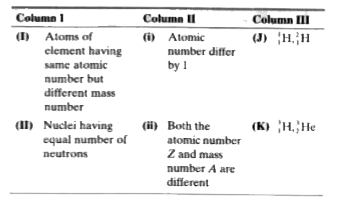
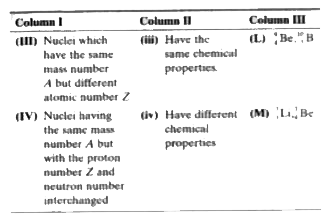
Determine the characteristics of mirror nuclei.
(I)(iii)(K)
(IV)(iii)(J)
(I)(ii)(M)
(IV)(i)(M)
The correct Answer is:A, B, C, D
Step by step video, text & image solution for In each question, there is a table having 3 columns and 4 rows. Based on the table, there are 3 questions. Each question has 4 options a,b,c and d ONLY ONE of these four options is correct. In the given table, Column I shows different types of nuclei, Column II shows their characteristics and Column III shows the example of different types of nuclei. Determine the characteristics of mirror nuclei. by Physics experts to help you in doubts & scoring excellent marks in Class 12 exams.
Updated on:21/07/2023Topper's Solved these Questions
- THE NUCLEUSBOOK - RESNICK AND HALLIDAYCHAPTER - THE NUCLEUSEXERCISE - PRACTICE QUESTIONS(Integer Type)
7 Videos
- THE NUCLEUSBOOK - RESNICK AND HALLIDAYCHAPTER - THE NUCLEUSEXERCISE - PRACTICE QUESTIONS (Linked Comprehension)
12 Videos
- THE KINETIC THEORY OF GASESBOOK - RESNICK AND HALLIDAYCHAPTER - THE KINETIC THEORY OF GASESEXERCISE - PRACTICE QUESTIONS
72 Videos
- UNITS AND MEASUREMENT BOOK - RESNICK AND HALLIDAYCHAPTER - UNITS AND MEASUREMENT EXERCISE - PRACTICE QUESTIONS (MATRIX-MATCH)
11 Videos
Similar Questions
The following table has 3 columns and 4 rows. Based on table there are THREE questions. Each question has FOUR options (A) , (B) , ( C) and (D) . ONLY ONE of these four options is correct
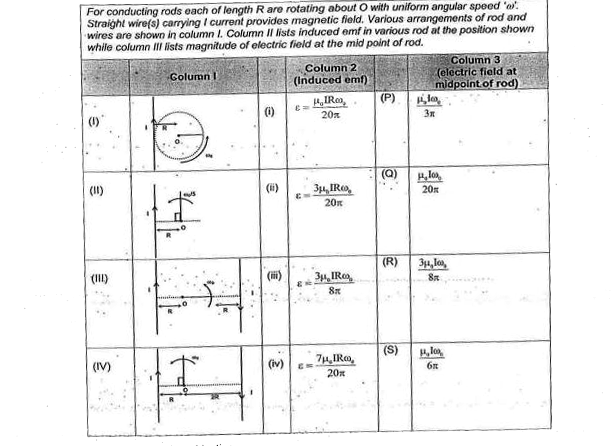
View SolutionIn each question, there is a table having 3 columns and 4 rows. Based on the table, there are 3 questions. Each question has 4 options (a), (b), ( c) and (d), ONLY ONE of these four options is correct.
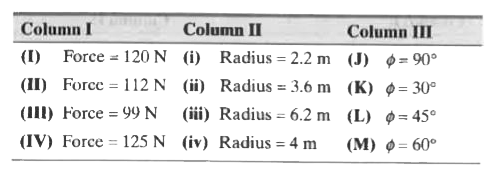
Which object has 137.5N⋅m as the resulting torque (as a vector)?
View Solution
Knowledge Check
In each question, there is a table having 3 columns and 4 rows. Based on the table, there are 3 questions. Each question has 4 options a,b,c and d ONLY ONE of these four options is correct.
In the given table, Column I shows different types of nuclei, Column II shows their characteristics and Column III shows the example of different types of nuclei.
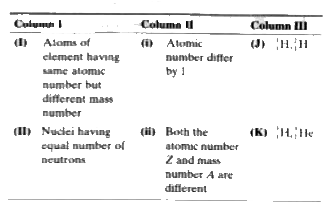
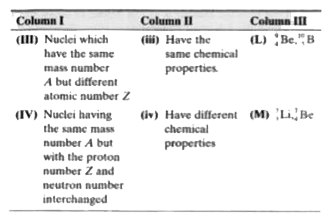
Determine the characteristics of isotones.A(III)(i)(K)B(I)(i)(L)C(II)(ii)(L)D(I)(ii)(M)In each question, there is a table having 3 columns and 4 rows. Based on the table, there are 3 questions. Each question has 4 options a,b,c and d ONLY ONE of these four options is correct.
In the given table, Column I shows different types of nuclei, Column II shows their characteristics and Column III shows the example of different types of nuclei.
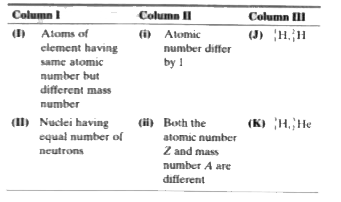
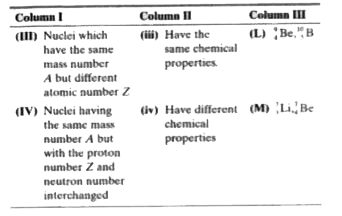
Determine the characteristics of isobars.A(III) (ii) (L)B(III)(iv)(K)C(II)(i)(K)D(II)(i)(K)In each question, there is a table having 3 columns and 4 rows. Based on the table, there are 3 questions. Each question has 4 options (a), (b), ( c ) and (d), ONLY ONE of these four options in correct.
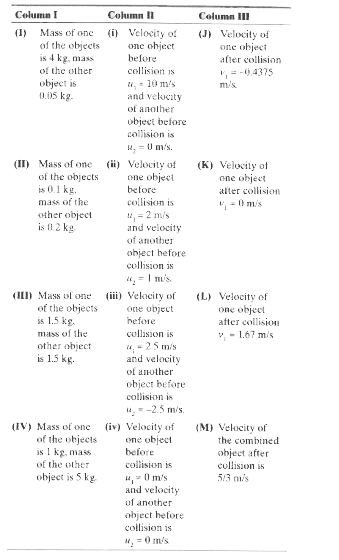
In which condition is the total momentum after collision 10 kg m/s ?A(I) (ii) (J)B(IV) (i) (M)C(II) (iii) (K)D(I) (i) (L)
In each question, there is a table having 3 columns and 4 rows. Based on the table, there are 3 questions. Each question has 4 options (a), (b), ( c) and (d), ONLY ONE of these four options is correct.

Which object has 480N⋅m as the resulting torque (as a vector)?
View SolutionThe following tables has 3 columns and 4 rows. Based on each table, there are THREE questions. Each question has FOUR options (A), (B), (C), and (D). ONLY ONE of these four options is correct
Q
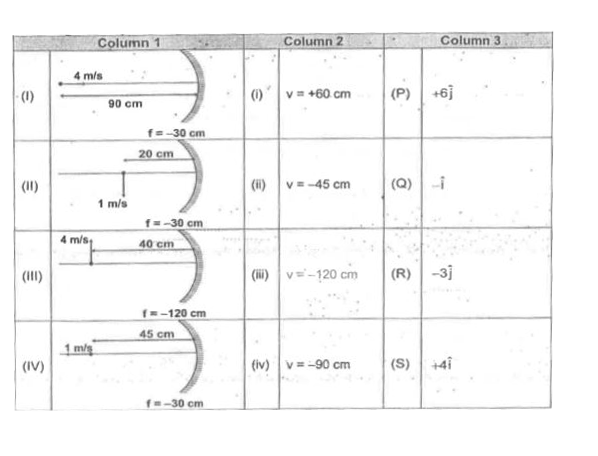
View SolutionThe following tables has 3 columns and 4 rows. Based on each table, there are THREE questions. Each question has FOUR options (A), (B), (C), and (D). ONLY ONE of these four options is correct
Q
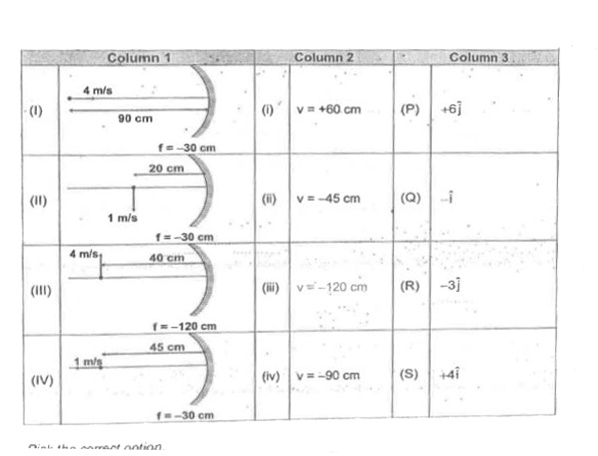
View SolutionIn each question, there is a table having 3 columns and 4 rows. Based on the table, there are 3 questions. Each question has 4 options (a), (b), (c) and (d), ONLY ONE of these four options is correct.
In the given table Column I lists the elements in the circuit, Column II shows their combination and Column III shows the circuit diagram.
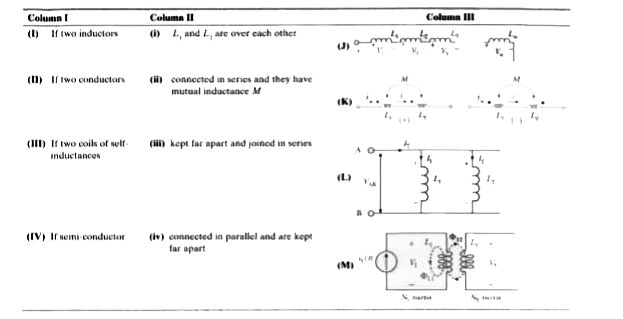
What are the conditions for M =K√L1L2?
View SolutionIn each question, there is a table having 3 columns and 4 rows. Based on the table, there are 3 questions. Each question has 4 options (a), (b), (c) and (d), ONLY ONE of these four options is correct.
In the given table Column I lists the elements in the circuit, Column II shows their combination and Column III shows the circuit diagram.
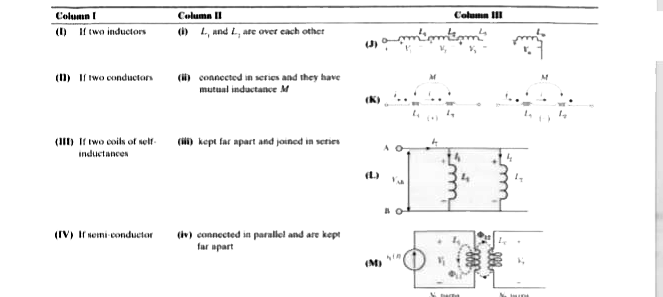
What are the conditions for L=L1+L2?
View Solution
